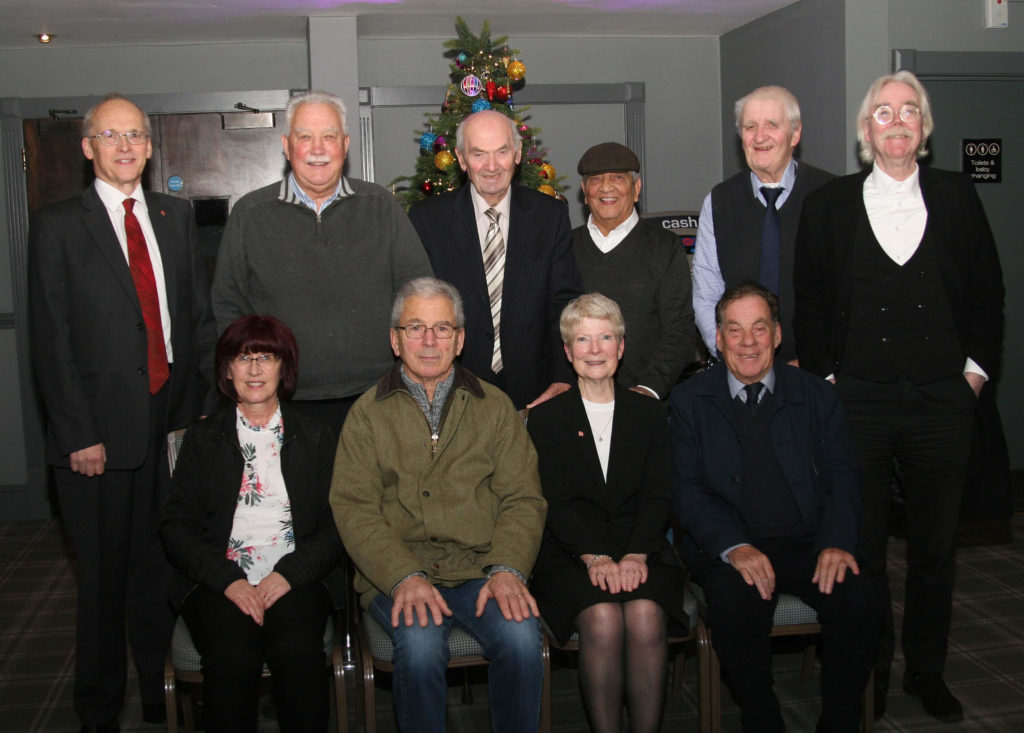PICKETS SUCCEED – CCRC REFERS SHREWSBURY PICKETS’ CONVICTIONS TO COURT OF APPEAL 4 March 2020
The Criminal Cases Review Commission has today finally agreed to refer the convictions of the Shrewsbury pickets to the Court of Appeal. Eight of the North Wales building workers who were jailed or received suspended prison sentences in 1973-74, will now get the chance to show that they suffered a miscarriage of justice. They are Des Warren, John McKinsie Jones, Ken O’Shea, Michael Pierce, Terry Renshaw, Kevin Butcher, Malcolm Clee and Bernard Williams.
The Shrewsbury 24 Campaign has worked tirelessly since 2006 to publicise the case and gain support from trade unions and the Labour Party. The Campaign’s Researcher and Secretary, Eileen Turnbull, travelled throughout the UK to find the fresh evidence necessary to persuade the CCRC to refer the case to the appeal court. The documents that Turnbull unearthed now form the basis for the appeal.
Terry Renshaw, speaking on behalf of the pickets, said, “We are absolutely delighted with the decision and look forward to our day in court to show that we were victims of a miscarriage of justice. Without the Shrewsbury 24 Campaign we would not be where we are today. We owe a great debt of thanks to them for the tireless work that they have carried out.”
The CCRC have accepted that the fresh evidence that we have submitted should be considered by the Court of Appeal:
Firstly, the police destroyed witness statements that they had taken at the start of their inquiries. These should have been given to the pickets’ lawyers even if the police did not want to use them.
Secondly, the fairness of the trial was prejudiced by an ITV documentary Red Under the Bed that was televised on the evening that the prosecution case finished. It showed footage of a police cordon outside Shrewsbury Crown Court during the trials and of the accused pickets leading a protest march through the town.
The pickets delivered their applications to the CCRC’s Birmingham headquarters nearly eight years ago, in April 2012. Since that time one of the applicants, Ken O’Shea, had passed away. Des Warren, who was blacklisted and never worked again after his release from prison in 1976, died prematurely in 2004. His son, Nick, has continued his dad’s long struggle to clear his name.
These eight pickets were determined to see justice done and were unbowed when the CCRC turned down their case in 2017. Four of them, Warren, Jones, Pierce and Renshaw, took judicial review proceedings and the CCRC caved in at court in April 2019. Today’s CCRC’s decision is a tribute to the pickets’ determination.
The Campaign has won the backing of 21 national trade unions, the TUC and the Labour Party. Hundreds of local union branches, trades councils and Labour Party branches affiliated to the Campaign.
Notes:
1. The Shrewsbury trials arose from the first and only national building workers’ strike, between June and September 1972. Building workers picketed sites that were still working, especially after 8 August 1972 when the unions declared an all-out strike.
2. Strikers in Chester and North Wales picketed sites in their region and on 6 September 1972 responded to a request from Oswestry strikers to visit their area to picket working sites. Six coaches went to Shrewsbury and Telford that day, visiting eight separate sites. Up to 80 police were present during the picketing and the open-air meetings that took place. No-one was arrested or cautioned on the day. The strike ended on 16 September with the unions accepting a significant pay rise.
3. On 14 February 1973 six pickets were arrested and eighteen received summonses. The 24 were divided into three groups and tried at Shrewsbury Crown Court. The first trial was of six so-called ring-leaders, who faced over 90 separate charges. The prosecution decided to proceed with just three: conspiracy to intimidate, affray and unlawful assembly. After a twelve week trial three pickets, Des Warren, Ricky Tomlinson and John McKinsie Jones were convicted of all three offences and sent to prison for 3 years, 2 years and 9 months respectively on each count, to run concurrently. The other three, Ken O’Shea, John Carpenter and John Llywarch, were only convicted of unlawful assembly and each received suspended prison sentences of nine months.
4. Half-way through the trial, on 13th November 1973, ITV broadcast a documentary, Red Under the Bed. The opening sequences panned across a police cordon surrounding Shrewsbury Crown Court. Later it showed several of the pickets currently on trial leading a trade union march through Shrewsbury. The pickets’ lawyers applied to the trial judge to find several regional ITV companies and the presenter, Woodrow Wyatt, in contempt but this was dismissed after the judge viewed the film in chambers. Further details are on the Campaign’s web-site:
https://www.shrewsbury24campaign.org.uk/the-trial/red-under-the-bed/.
5. The remaining 18 pickets were divided into two groups of nine and tried in two separate trials at Shrewsbury, commencing in January and February 1974 respectively. Three were convicted of affray and unlawful assembly and each imprisoned for six months and four months respectively on the two charges. Ten pickets were convicted of unlawful assembly and received suspended prison sentences of four months. One picket was convicted of using threatening behaviour and given a three-month suspended prison sentence. Only two pickets were acquitted.
6. The Shrewsbury 24 Campaign was set up following a meeting of trade unionists in Liverpool in 2006. They were motivated to obtain justice for the convicted pickets following the premature death of Des Warren in 2004 from drug-induced parkinsonism disease. He had been given a variety of drugs in prison between 1974 and 1976.
7. The CCRC press release:
https://ccrc.gov.uk/commission-refers-the-convictions-of-eight-members-of-the-shrewsbury-24/

 Follow
Follow